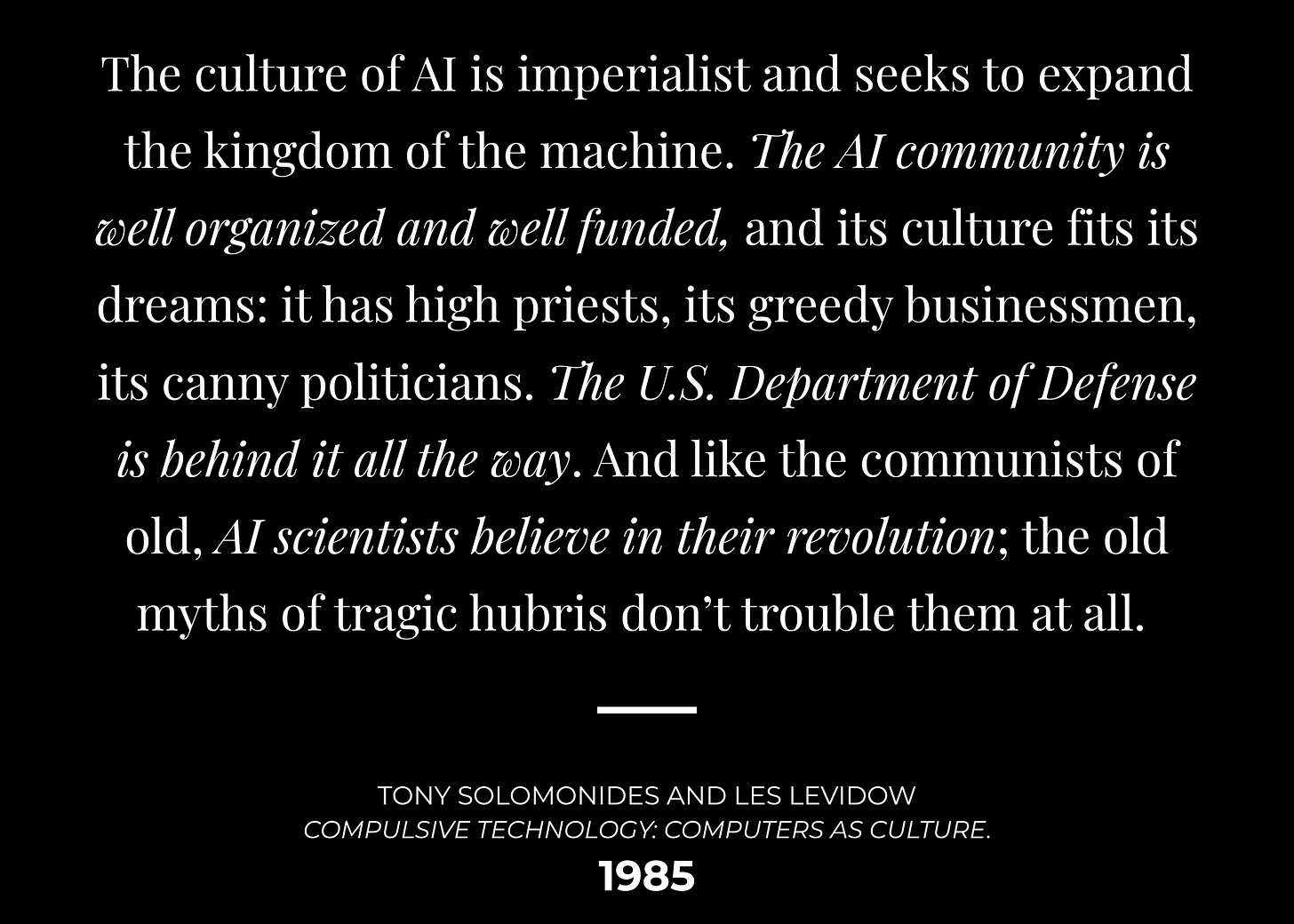70 years of AI hype
Quoting from Olivia Guest et al. (2025) "Against the Uncritical Adoption of AI Technologies in Academia."
I recently came across this wonderful position paper by Olivia Guest and colleagues, where they pick apart the tech industry’s marketing, hype, & harm, arguing for safeguarding higher education, critical thinking, expertise, academic freedom, & scientific integrity.
Guest, O., et al. Against the Uncritical Adoption of 'AI' Technologies in Academia. Zenodo, 5 Sept. 2025, https://doi.org/10.5281/zenodo.17065099.
I would highly recommend reading Olivia’s Bluesky thread on the paper. It’s a really great read especially for educators and academic researchers. What really jumped out at me were the quotes going back even 70 years that read as if they could have been written yesterday.
This isn’t the first wave of interest in AI, broadly defined. 1985:
The culture of AI is imperialist and seeks to expand the kingdom of the machine. The AI community is well organized and well funded, and its culture fits its dreams: it has high priests, its greedy businessmen, its canny politicians. The U.S. Department of Defense is behind it all the way. And like the communists of old, AI scientists believe in their revolution; the old myths of tragic hubris don’t trouble them at all.
Solomonides, Tony, and Les Levidow, eds. Compulsive technology: Computers as culture. The Free Press, 1985.
1955: We need to study AI so as to make machines use language, solve problems that humans can, and improve itself.
We propose that a 2 month, 10 man study of artificial intelligence be carried out during the summer of 1956 at Dartmouth College in Hanover, New Hampshire. The study is to proceed on the basis of the conjecture that every aspect of learning or any other feature of intelligence can in principle be so precisely described that a machine can be made to simulate it. An attempt will be made to find how to make machines use language, form abstractions and concepts, solve kinds of problems now reserved for humans, and improve themselves. We think that a significant advance can be made in one or more of these problems if a carefully selected group of scientists work on it together for a summer.
McCarthy, John et al. (1955). A proposal for the Dartmouth summer research project on artificial intelligence. URL: http://jmc.stanford.edu/articles/dartmouth/dartmouth.pdf.
On hype, 1985:
The culture of AI encourages a firm, even snide, conviction that it’s just a matter of time. It thrives on exaggeration and refuses to examine its own failures.
Athanasiou, Tom (1985). “Artificial intelligence: cleverly disguised politics”. In: Solomonides, Tony, and Les Levidow, eds. Compulsive technology: Computers as culture. The Free Press, 1985.
1984: On rejection of expertise, even our own.
Being in a colonizing discipline first demands and then encourages an attitude that might be called intellectual hubris. Furthermore, since you cannot master all the disciplines that you have designs on, you need confidence that your knowledge makes the ‘traditional wisdom’ of these fields unworthy of serious consideration. Here too, the AI scientist feels that seeing things through a computational prism so fundamentally changes the rules of the game in the social and behavioural sciences that everything that came before is relegated to a period of intellectual immaturity.
Turkle, Sherry (1984). The second self: Computers and the human spirit. MIT Press.
Go read the whole paper. It’s good.
Guest, O., et al. Against the Uncritical Adoption of 'AI' Technologies in Academia. Zenodo, 5 Sept. 2025, https://doi.org/10.5281/zenodo.17065099.


terrifying compilation of papers.
I will surely read some :)
Highly recommend the book “The AI Con” which also teaches how to recognize the hype and how to find it - Dr Emily Benders book (I can’t remember the other author)